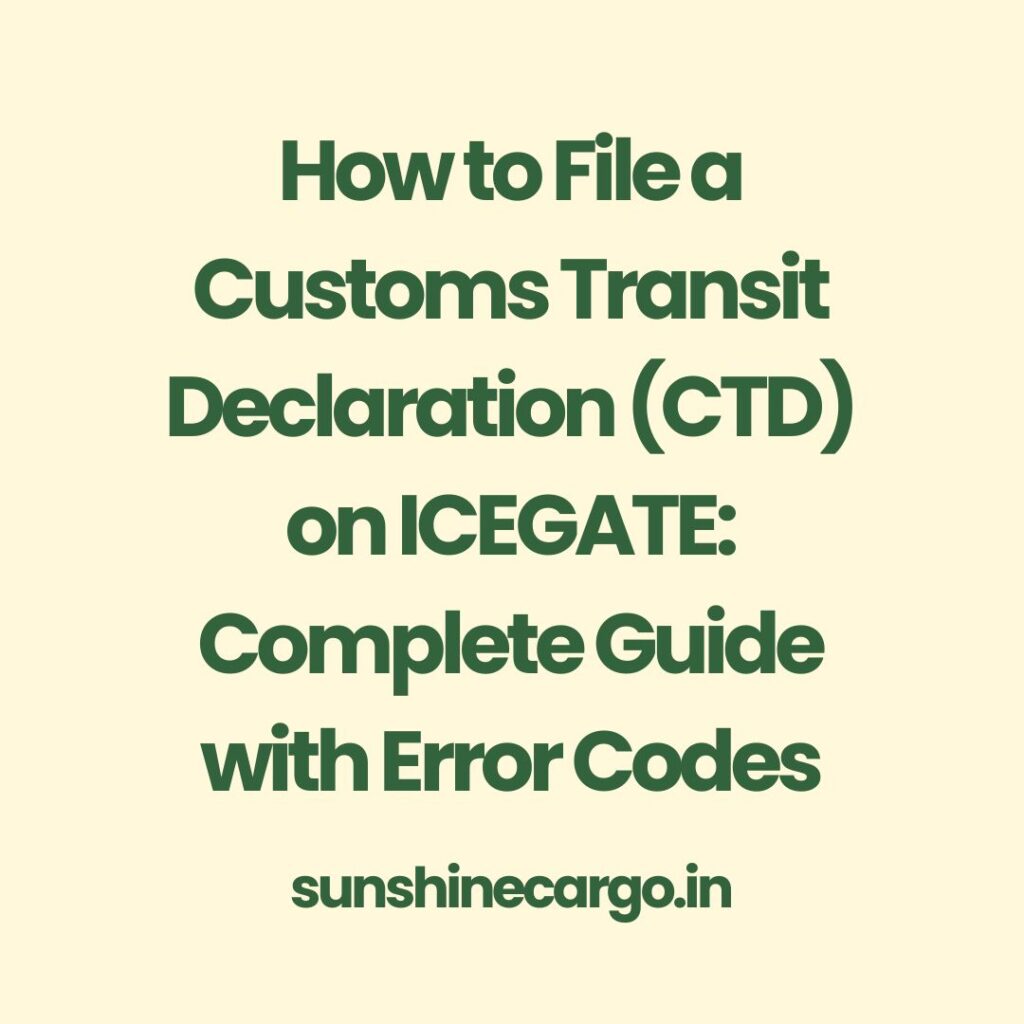Disclaimer: This article is intended for educational purposes only and is issued in public interest. The information is based on the official user manual issued by ICEGATE. We do not claim any copyright over the content, and all rights and ownership belong to ICEGATE and the Central Board of Indirect Taxes and Customs (CBIC).
The information mentioned here is subject to change and may still be under development or refinement. For the most accurate and up-to-date guidance, it is strongly advised to contact ICEGATE service centres before using the CTD Webform.
How to File a Customs Transit Declaration (CTD) Using ICEGATE Webform: Full Step-by-Step Guide
The Customs Transit Declaration (CTD) is a critical document for goods moving between customs jurisdictions. ICEGATE 2.0 now allows users to file CTDs digitally using its webform. This blog explains every step of the process in simple language for importers, exporters, and customs brokers (CHAs).
What is the CTD Webform on ICEGATE?
The CTD Webform is an online form available on the ICEGATE portal that allows registered users to submit Customs Transit Declaration details electronically. Once submitted, users receive a system-generated Tracking ID for reference.
Who Can Use the CTD Webform?
The following stakeholders are allowed to file CTDs on ICEGATE:
Importers/Exporters
Customs House Agents (CHAs)
How to Log in and Access the CTD Webform
Log in using your ICEGATE ID and password
Select User Type as ICEGATE User
Navigate to Services Widget > Electronic Filing > Webforms
Click on the CTD Webform link
How to Fill the CTD Webform
The form is divided into four segments. Each segment contains mandatory fields marked with an asterisk (*).
Segment 1: Main Details
Fields required:
Message Type
Job Number & Date
CTD Type
Customs House & Exit Customs House Code
Importer Type
CHA Code and Name
Importer IEC, Name, and Address
Notified Importer Name and Address
Letter of Credit Number and Date
Mode of Transport (Rail/Truck)
Transit Route
Currency Code & Exchange Rate
CIF Amount, Value in INR
Country of Consignment and Origin
License Details (Optional)
Insurance Details (Optional)
Certificate of Origin Date
Invoice Number & Date
Segment 2: Item and Bond Details
Item Details
Item Number
Customs Tariff Head
Goods Description
Chassis No., Engine No., Vehicle Registration (All Optional)
Quantity & Unit Quantity Code
CIF Value
Sensitive Goods (Y/N)
Duty & Antidumping Amount
Bond Amount (Optional)
Use the Add Item Details button to add multiple items.
Bond Details
CTD Number and Date
Bond Number and Code
Bank Guarantee Rate (Optional)
Use the Add Bond Details button to add multiple bonds.
Segment 3: IGM Details (Import General Manifest)
IGM Number, Date, and Line Number
Inward Date
Port of IGM
MAWB/BL Number & Date
HAWB/HBL Number & Date (Optional)
Total Packages, Gross & Net Weight
Unit Quantity Code, Package Code
Marks and Numbers (Optional)
Use the Add IGM Details button to include more lines.
Segment 4: Container Details
Container Number & Size (Optional)
Seal Number
Truck or Wagon Number (Optional)
Site ID (Mandatory)
Use the Add Container Details button to input multiple records.
How to Submit the CTD Webform
Authenticate using your Digital Signature Certificate (DSC)
Click Submit
If successful, a Tracking ID will be generated and shown on the dashboard and emailed to the user
If there’s any data mismatch or invalid info, the form will be rejected and a negative acknowledgment will be issued.
Other Features of the CTD Webform
Preview Button
Click to preview all filled details before final submission
Edit Button
Enabled after clicking Preview
Lets users make corrections
Save as Draft
Use Save as Draft to store your progress
Drafts appear under the Drafts widget on the dashboard
You can resume later by selecting your draft
Offline Utility
Allows users to work offline using the export/import option
Export File:
Save a partially filled form in JSON format
Import File:
Load a saved file to resume and complete submission
Print Button
Click to print the filled form for recordkeeping
Error Codes and What They Mean
If your submission fails, you will receive an error code. Each code corresponds to a specific issue—like invalid CTD type, incorrect IEC, duplicate entries, expired licenses, etc.
101 Invalid CTD Type
102 Invalid Exit Point
103 Invalid CHA Number
104 CHA License Expired
105 Invalid IEC
106 Letter of Credit/Embassy Letter Not Available
107 Invalid LC Number
108 Letter of Credit Expired
109 Invalid Mode of Transport
110 Invalid Transit Route
111 Invalid Country of Origin
112 Invalid Consignee Country
113 Invalid Currency Code
114 No/Duplicate Master Record
115 Invalid IGM No+Date+Mawb_no+Hawb_no
116 Invalid IGM UQC
117 IGM Pkg <= 0
118 IGM G.Wt <= 0
119 IGM N.Wt <= 0
120 Invalid IGM Line No. <= 0
121 InWard Date is Null
122 BE is Filed For The Line
123 IGM Line in Process
124 SMTP Issued For The Line
125 Invalid Cargo Movement
126 Duplicate IGM Record
127 No IGM Record Exists
128 Invalid Item No.
129 Invalid Item Quantity
130 Invalid Item CIF
131 Invalid Item Market Value
132 Invalid Item UQC
133 Invalid Item CTH
134 Duplicate Item
135 No Item Exists
136 Invalid Bond Number
137 Bond Code is NULL
138 Bond Amount is NULL
139 Duplicate Bond No.
140 Truck No is NULL
141 Invalid IGM in Container
142 Duplicate Container
143 No Container Exists
144 Destination Port Not Match with IGM
145 Invalid CHA Number
146 Invalid LC Number
147 Latest Currency Rate Not Available
Always refer to these codes when facing submission issues or consult ICEGATE support.
Need Help? Contact ICEGATE
Pr. ADG, ICEGATE
Director General of Systems & Data Management, CBIC
1st Floor, Central Revenue Building, Indraprastha Estate, New Delhi – 110 109Toll-Free: 1800-3010-1000
Final Thoughts
The CTD Webform on ICEGATE 2.0 simplifies transit documentation for goods moving under customs control. With segment-wise data entry, offline tools, and validation features, this system ensures accurate and efficient processing.
When in doubt, always check with ICEGATE service centres or your designated customs officer.
For official guidance and troubleshooting, always refer to ICEGATE or CBIC documentation.




